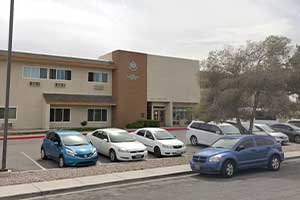Skip To Rehab Listing
Drug and Alcohol Rehab Settings and Approaches in North Las Vegas, NV.
Alcohol and drug addiction impacts people of all ages, genders, and walks of life. The addiction treatment centers and resources, such as inpatient rehabs, long term drug and alcohol rehabs, inpatient detox programs, short term treatment centers, outpatient individual counseling, are intended to offer high-quality care to anyone who struggles with substance abuse, regardless of their personal situation.
Alcohol and drug rehabs in the North Las Vegas area are not all the same. They offer a range of methods, such as matrix model, motivational interviewing, cognitive/behavior therapy, vocational rehabilitation services, contingency management/motivational incentive, individual psychotherapy, that allow patients to address their alcohol and drug dependency in the way that is most effective for them.
Special Programs for Substance Abuse Treatment
Despite the prevalence of addiction, each individual who struggles with alcohol and drug abuse issues has their own specific circumstances that require a personalized strategy. That is why the rehabs in North Las Vegas offer several special services like housing services, treatment for spanish-speaking clients, active duty military, social skills development, suicide prevention services, clients with HIV/AIDS.
Accepted Rehab Payment Options
Patients and their families should not defer rehab because of worries about cost. Treatment centers offer several alternatives for payment, like the following: private insurance, private pay, sliding fee scale, payment assistance, other state funds, access to recovery (atr) voucher. Addiction treatment programs can direct patients and their families toward the payment plans that will put rehabilitation within reach.
People who struggle with substance abuse should not hesitate to take advantage of the many resources available in North Las Vegas, Nevada.
Commonly Asked Questions about Addiction and Treatment
How do I stop enabling an addict?
"Helping someone stop enabling an addict can be a challenging process, as the enabler often has deeply ingrained habits and patterns that need to be addressed. Here are some steps to consider:
Recognize Enabling Behavior: First, you need to identify the behaviors that are enabling the addiction. Enabling behaviors can include things like providing money that funds the addiction, covering for the addict's mistakes or responsibilities, or continually forgiving harmful behavior without setting boundaries.
Educate Yourself: Learn about addiction and its dynamics. Understanding that addiction is a disease and not merely a matter of willpower can help change your perspective and reactions.
Set Boundaries: Establish and communicate clear, firm boundaries regarding what you will and won't accept. Stick to these boundaries even if it's difficult.
Stop Rescuing: Refrain from protecting the person from the consequences of their addictive behavior. It is important for them to experience the full impact of their actions.
Encourage Treatment: Instead of protecting the person from their addiction, encourage them to seek professional help. Offer to assist in finding treatment options or attending support groups.
Seek Support: Enabling patterns can be tough to break. Seek help from therapy, counseling, or support groups like Al-Anon. These resources can provide you with tools and strategies to stop enabling.
Practice Self-Care: Ensure you're taking care of your own physical and emotional health. It's easy to get so wrapped up in the addicted person's problems that you neglect your own needs.
Maintain Consistency: It's essential to be consistent with your new approach. If you occasionally slip back into enabling behaviors, the person with the addiction may continue to expect it.
Be Patient: Changing long-standing patterns of behavior takes time, both for you and the person with the addiction. Remember to be patient with yourself and with them.
Remember, You're Not to Blame: Addiction is a complex disease influenced by many factors. It's important to remember that you're not responsible for the other person's addiction or recovery. Your role is to support in healthy ways, not to cure the addiction.
When do you walk away from a loved one that is a drug addict?
Deciding to distance yourself from a loved one who is struggling with addiction is a deeply personal and difficult decision. There's no universal right or wrong answer, as it depends on the individual circumstances, the severity of the addiction, the impact on your wellbeing, and other factors. However, there are a few circumstances where walking away might be the appropriate course of action:
- Self-preservation: If the relationship with the loved one is causing significant harm to your mental, emotional, or physical health, it may be necessary to establish boundaries or distance yourself for your own wellbeing. Remember, you can't effectively support others if you're not taking care of yourself.
- Enabling Behavior: If your actions are enabling the individual's substance abuse rather than supporting their recovery, creating distance might be beneficial. Enabling can include covering up for their substance use, providing financial support for their habit, or repeatedly rescuing them from the consequences of their behavior.
- Lack of Respect for Boundaries: If your loved one consistently ignores or disrespects boundaries that you have established, it might be time to consider distancing yourself.
- Abuse or Violence: If your loved one becomes abusive or violent under the influence of drugs, prioritizing your safety is crucial. In such instances, it's critical to seek help from local authorities or a domestic violence hotline.
- Unwillingness to Seek Help: If your loved one consistently refuses to seek help, denies they have a problem, or repeatedly relapses without making an effort towards recovery, it might be necessary to consider distancing yourself.
Why do people abuse addictive substances?
People may abuse addictive substances for a variety of reasons, often involving a complex interplay of biological, psychological, and social factors. Here are some common reasons:
Biological Factors: Certain individuals may be genetically predisposed to addiction. This could involve inherited traits that affect the way substances interact with their brain or influence their susceptibility to mental health disorders, which can increase the risk of substance abuse.
Psychological Factors: Many people turn to addictive substances as a way to cope with mental health issues such as depression, anxiety, or post-traumatic stress disorder. Substance use may provide temporary relief from these conditions, though in the long term it often exacerbates them.
Social Factors: Peer pressure, especially among young people, can lead to substance abuse. If an individual is in an environment where drug or alcohol use is common, they may feel compelled to partake in order to fit in.
Environmental Factors: Stressful or traumatic environments can increase the risk of substance abuse. This can include living in poverty, experiencing abuse or neglect, or being exposed to violence.
Curiosity and Experimentation: Particularly among adolescents and young adults, the desire to try new experiences can lead to substance use.
Self-Medication: Some people use substances to self-medicate physical pain. For example, the opioid crisis has been fueled in part by individuals who initially used prescription opioids to manage pain and then developed an addiction.
Escapism: People may use substances to escape their reality, numb emotional pain, or simply to feel good. Addictive substances often provide a temporary sense of euphoria or relaxation, which can be enticing.
Co-occurring Disorders: Individuals with co-occurring mental health disorders are at a significantly higher risk of substance use disorders. This is because these individuals might use substances as a form of self-medication.














